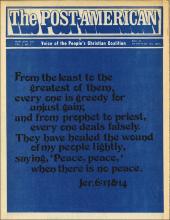"Offer up your bodies as a living sacrifice ... and stop being conformed to this age, but be transfigured by the renewing of the mind" (Romans 12:1-2).
Since sacrificial ritual is foreign to our culture, this metaphor of sacrifice means little to us, but Paul elsewhere uses another, more universal metaphor with the same meaning: death. "Consider yourselves to be dead to sin, but alive unto God in Christ Jesus" (Romans 6:11). "For you have died, and your life is hidden with Christ" (Colossians 3:3). "We always carry about the death of Jesus in the body, in order that the life of Jesus might be revealed in our body" (2 Corinthians 4:10). To Paul the body does not mean the extension of flesh in time and space, but the totality of human life. He is encouraging us to place our entire lives at God's disposal, to become living sacrifices, the breathing dead.
How is this paradox possible? The death that lives is the nonconformity of the Christian to this age, the transfiguration of the mind.
Christians, like all people, have been fashioned by the spirit of this age, formed by the values, assumptions, loyalties and pressures of the world, but now that they have become children of God, to prevent the age from determining their conduct. The tense of the word "conformed" in Greek suggests that the task of nonconformity is continual, never consummated, never attained. Christians must always examine how the world would enslave them to conformity (Marcuse's "one-dimensionalism"?), narrow their ethical options, pull them away from the ideal to the practical, dim their view of God's will in the world, co-opt their obedience. They must continually make themselves aware of the myths of this age.
Read the Full Article

